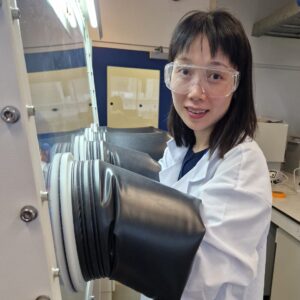#FaradayPathways Chun (Ann) Huang, Imperial College London
Ann Huang is a Senior Lecturer in Energy Storage Materials in the Department of Materials at Imperial College London. Her career story highlights the power of a final year undergraduate degree project in setting a career direction and the importance of the support and encouragement of more senior researchers in establishing an academic career…
 Ann completed a BEng in materials science and engineering at Imperial College London, where her final year project was researching cathode materials in solid oxide fuel cells, supervised by Prof. John Kilner and Prof. Stephen Skinner. This set a career trajectory that has continued to this day.
Ann completed a BEng in materials science and engineering at Imperial College London, where her final year project was researching cathode materials in solid oxide fuel cells, supervised by Prof. John Kilner and Prof. Stephen Skinner. This set a career trajectory that has continued to this day.
“Most undergraduate curricula don’t cover detailed electrochemistry and this project sparked my interest in the field.”
After completing her undergraduate degree Ann moved to the University of Oxford for her DPhil in processing and properties of structured solid-state energy storage devices, supervised by Prof. Patrick Grant. This led to a post-doc position in the same group where she contributed to an aligned project on energy storage for low carbon grids led by Prof. Nigel Brandon at Imperial. After that, she successfully secured an EPSRC UKRI Innovation Fellowship on novel manufacturing of next generation batteries. Though not directly funded by the Faraday Institution while at Oxford, her research was affiliated with the SOLBAT (solid-state batteries) and Nextrode (electrode manufacturing) projects.
In 2020, Ann was awarded her first academic position as Lecturer at King’s College London.
“Prof. Patrick Grant was very supportive of my move and encouraged me to apply for funding for a PhD studentship as part of the second Faraday Institution PhD cohort, which enabled me to start my research group at King’s.”
Subsequently, Ann was awarded a Faraday Institution Industry Fellowship, partnering with Hitachi High-Tech Europe to develop, refine and commercialise innovative electrode manufacturing equipment. The fellowship is aiming to improve electrochemical performance for both lithium-ion and solid-state batteries.
“The FIHQ has offered helpful and friendly advice providing pointers for me to investigate whether the results of the fellowship have commercial applications.”
In 2022 her career moved full circle when the opportunity arose to become a Senior Lecturer at Imperial. Her research has two main areas, developing advanced manufacturing technologies and correlative imaging characterisation, both for the application of electrochemical energy storage devices including lithium-ion and solid-state batteries. She has pioneered a correlative imaging characterisation technique of combining X-ray inelastic scattering and X-ray computed tomography to investigate battery materials. She joins the Faraday Institution Degradation project in April 2023 as co-investigator for a work area that will characterise solid electrolyte interphase (SEI) layers for zero-excess lithium metal batteries using this new operando technique.
So, what advice does Ann have for people wanting to go down an academic career route?
“I love doing research. I’d encourage people to choose the research topic they truly enjoy and persevere.
“We have already had meetings in the Degradation project about the work that has been completed so far and future work plan. Profs. Clare Grey and Louis Piper have been extremely helpful in encouraging me to pursue the research I am passionate about and linking the work to the collaborative programme.
“I have received a lot of support from many academics both in my department and college-wide, including Prof. Sandrine Heutz and Prof. Peter Haynes, who have welcomed me and helped me start my research. The support and encouragement of more senior researchers such as Prof. Mary Ryan, who encouraged me to apply for the grants and given me invaluable advice, has been extremely important to me.
“The Faraday Institution is important to UK-based energy storage researchers as previously there wasn’t a flagship institution that shows the importance of this research. It brings people together and now researchers recognise and know of the Faraday Institution internationally.”
Researcher interview published March 2023.

